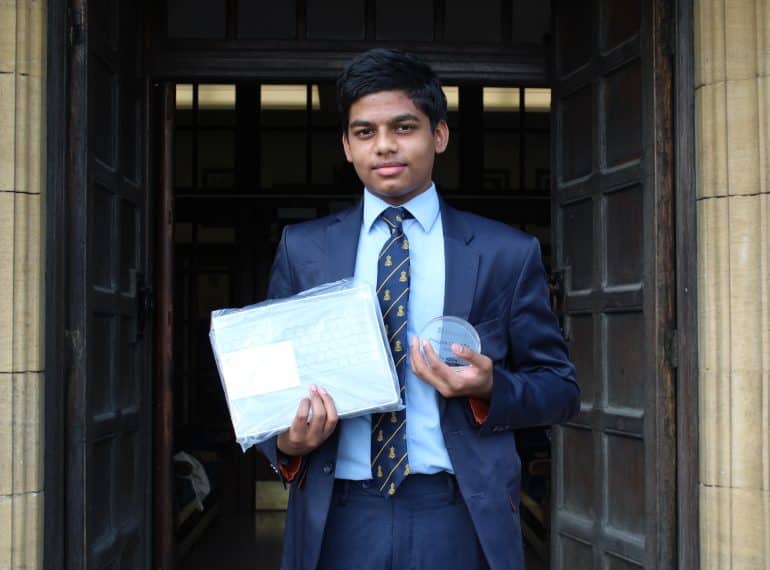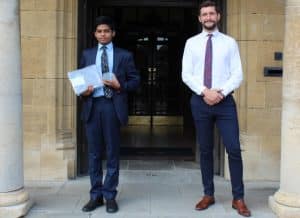A winner again! Ashwin scores success for QE in global technology competition

Year 11 pupil Ashwin Sridhar has crowned a series of wins in competitions he entered during lockdown with outstanding international success in the prestigious Microsoft Imagine Cup Junior.
He was named among just three winners from across the vast EMEA (Europe, Middle East and Africa) area after designing an artificial intelligence-powered device to help tackle the crisis in care for the elderly. Ashwin was one of only nine winners across the whole world and was the sole UK winner.
The same design also brought him success in another competition – the Connect the Community: Design Challenge – where it was named among the 10 winning entries in phase 1 of the challenge.
 Congratulating him, QE’s Head of Technology Michael Noonan said: “Ashwin is an outstanding Technology student who has had a tremendous year. Despite the challenges of the school closure, or perhaps even taking advantage of them, he threw himself into many competitions using his vast technological experience. He was successful in eight competitions on a local, national and, with his latest win, international level. He should be extremely proud of his achievements this year, and he undoubtedly has a bright future ahead of him!”
Congratulating him, QE’s Head of Technology Michael Noonan said: “Ashwin is an outstanding Technology student who has had a tremendous year. Despite the challenges of the school closure, or perhaps even taking advantage of them, he threw himself into many competitions using his vast technological experience. He was successful in eight competitions on a local, national and, with his latest win, international level. He should be extremely proud of his achievements this year, and he undoubtedly has a bright future ahead of him!”
Like the Imagine Cup, Microsoft’s sister competition for older students, Imagine Cup Junior provides those aged 13 to 18 with the opportunity to learn about technology and about how it can be used to positively change the world. In 2020, the competition was focused on artificial intelligence (AI), with participants challenged to come up with ideas to solve social, cultural and environmental issues.
Ashwin’s design, named AI RetroMate, is an all-in-one solution to help the elderly and carers with their everyday lives. An Internet-connected hub that dispenses, chats, and detects loneliness, AI RetroMate is controlled by a virtual caregiver and aims to support independence for elderly people who require care but want to stay at home.
Its features include:
- A remote connection that uses cellular IOT (Internet of Things) technology to keep carers and patients connected reliably and securely, thus helping reduce the cost and strain of full-time care
- A ‘chatbot’
- A remote hub with a built-in a pill dispenser, incorporating facial recognition for additional safety
- An attractive retro design.
After first researching online, Ashwin entered the cup competition, using AI to develop and prototype the device. As part of the project, he had to delve into advanced Mathematics to help enhance the prototype, using, for example, ‘nearest neighbour’ algorithms and linear regression models.
Ashwin developed his project late in lockdown, deploying CAD (Computer-aided Design) and electronics to create a prototype, using skills that he had learned in Design and Technology and in Physics.
Speaking on behalf of the judging panel, Tina Jones, Business Strategy Lead, Azure Skills and Employability, said: “The judges were thoroughly impressed by AI RetroMate, especially the research [Ashwin] had undertaken into the difficulties faced by the elderly and by carers and how to create something to improve the quality of their lives.
“We particularly liked how [he] added a chatbot following initial product feedback, and the video, and how [he] brought the product to life with [his] CAD drawing was incredible. [Ashwin’s] concept, ethics and use of AI was thorough, well thought-through, and it was clear how much effort [he] had put into [his] project.”
Ashwin, who won a trophy as well as a prize of Microsoft’s Surface Go tablet computer and case, said: “This project has helped me to explore STEM [Science, Technology, Engineering & Mathematics], using and developing skills from class to help solve real-world problems.”
In the Connect the Community: Design Challenge (run by RS Components, Nordic Semiconductor and Cadent), having been chosen as one of the international winners of phase 1, Ashwin is now working towards a final prototype, in time for the second phase, where he could receive the funding to help to bring his product to life.
